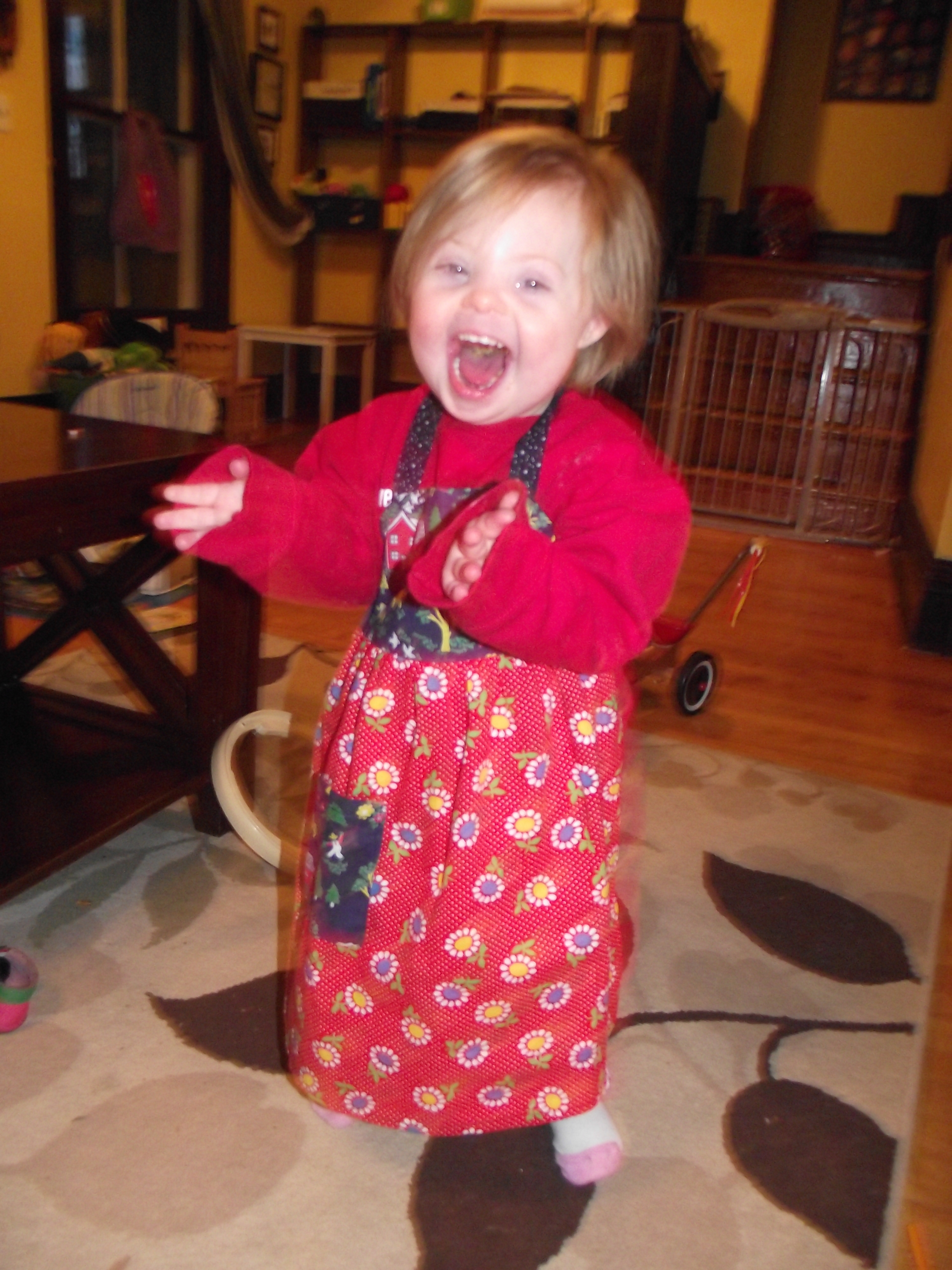Rowenna has started a period of transition and I’ve been thinking quite a bit about the choices we’ve made for her so far and the choices we will need to make in the next few months. As part of my thought process, I’ve been having discussions with other moms in the Down syndrome community. We decided to explore some of the Big Questions through our blogs and a blog hop. Please visit Lisa’s blog and check out what other parents are saying about ableism, achievement, and therapy.
So, what’s our take on therapy? Why do we do it?
Before I start, I want to be clear that I absolutely support therapies. My daughter had a feeding tube for 6 months and I am convinced that without the support of our speech therapist, Rowenna would have used the tube even longer and may not be the successful eater she is today. I think therapy has a use and a place and we still participate in Birth to Three therapies, but we do it for a much different reason today than we did two years ago. I cannot say what each family needs or what each child needs and for that reason I will always defend the right to access therapy.
I also want to say that I love our therapy team. They have been very accepting of this momma radically changing her mind about therapy and open to adjusting therapies as Rowenna needs it.
That being said, I do have mixed feelings about therapy and the way it’s pushed as some sort of panacea in the Down syndrome community.
In the Down syndrome community, I see a great deal of ableism – and I’m not sure most people even realize it. Even our battle cry “more alike than different” is a form of ableism. When we are “alike,” aren’t we really saying “normal,” “on time,” or “typical”? We strive, from birth, to prove how normal our kids and our lives are. We praise each other when our kids meet milestones on time, and we distance ourselves from members of our own community whose children aren’t as “normal” as we claim kids with Ds to be. We never hear from our fellow Ds moms who have 8 year olds yet to be potty trained, moms of school age children who do not use spoken communication, moms of kids for whom school is a true struggle and full inclusion is simply not happening. There does not seem to be a lot of room for their stories in the picture we paint of “more alike than different.” I’ve even been told by a few moms of older kids that they are afraid to share their stories, unsure how they will be received by the rest of us.
That is heart breaking.
We push therapy and push it hard. I can’t tell you the number of times I’ve heard the following advice: “Get all the therapy you can get – then push for more! If it hadn’t been for therapy, my kid never would have walked ‘on time’!”
Why this focus on doing things “on time”? And at what cost are we striving for our kids to be “on time”? Is it worth the time given up as a family, the people coming into our homes, the constant focus on milestones and ability? What’s the difference between walking at 20 months or 26 months? There are no studies that I know of that show any connection between meeting milestones on time and future ability.
When our kids are past “time” to achieve something, does that mean therapy failed? Or us parents? Or is it a simple matter that kids with Down syndrome often experience delays, and this is just a natural manifestation of that?
Is it possible that instead of “more alike than different,” a more accurate rallying cry would be “different is ok”? We can support our children and have high expectations while still celebrating who they are and what they can do. Delays are going to happen, and that’s ok. Different is ok.
I started to question the purpose of therapy when Rowenna was 18 months old. Until that point, Rowenna had hours of therapy each week, starting at 6 weeks old. She was in full heart failure and no one ever questioned whether or not she should be taxed through physical therapy. Not once. It was just what you do. Down syndrome? Insert one quarter into the Birth to Three machine. Receive services until age three. Simple. Easy. No muss, no fuss.
No one ever explained what the heck we were doing in physical therapy, and I didn’t think to ask. All I heard from the Down syndrome community was that it was important and the key to her success. She had to reach her full potential. Well, I wasn’t going to stand in the way of that.
But what was so damn important that I was putting a child in heart failure through physical therapy? I guess we had to help her meet those milestones on time, we had to help her be as normal as possible.
After her surgery she was pink and perky, ready to move. So we continued therapies and developmental assessments and I still never asked what we were doing or why. Again, it’s just “what you do” and was always presented as such. I feel lucky that we have a team of therapists who guided us along the way by asking gentle questions like “how can we help Rowenna participate in family activities?” It’s never been about milestones or exercises for her therapists, and I think that’s why it took me so long to even stop and consider what we were doing, and the reason we continue therapy today. So even before I started questioning what we were doing, our team was already modeling the approach we would later strive for.
It wasn’t until we had an absolutely horrible experience with a developmental assessment that we really started to examine what we were doing with Rowenna and why. What was all of this therapy for? Do these experts know more about our child than we do? Is Rowenna benefiting from therapies?
So we sat down and thought about it. We saw that Rowenna wasn’t necessarily learning new skills through therapy, but she was clearly benefiting from having other adults in her life invest time and energy and ask her to rise up to a challenge. We also realized that we were no longer consumed by the idea of being “on time.” Rowenna had proven enough times that she is just going to do things when she’s ready, and not a second earlier, and therapy wouldn’t change that. We wanted to help Rowenna integrate into home life – work with us as we did normal things like sweep the floor, dig in the garden. Our therapists had been asking us about this all along, but now we were being very intentional about it and our therapy plan reflected it. Gone were milestones, in were a tiny broom, a stool to help her reach, a small shovel for the dirt.
We also saw that she would give her all to include herself in activities when she was surrounded by peers. She would challenge herself and try new skills if she saw others doing the same. We cut back on therapy and instead started putting her in activities for typical kids and she blossomed.
As I said, I think therapy can be a great thing for kids, even a life-changing thing. What I object to is the attitude that all kids with disabilities need therapy, and they all need it from the start, and they all need as much as they can get. We started physical therapy at 6 weeks. Not because she was already delayed at 6 weeks, but because she has Down syndrome and it’s what you do. No one (including myself) was looking at Rowenna as an individual with distinct abilities and needs, we were all seeing a diagnosis and “treating” accordingly – and no one was talking about ways to help Rowenna that involved being out in the community.
All over Down syndrome support boards I see moms posting that their lives are consumed by therapy or the schedule is straining their relationships…and what is the reply I often read and hear? Advice to keep at it, piling on that special needs mom guilt that tells us we don’t ever want to look back and wonder “could I have done more?” Even we mommas rarely advise each other to step out of therapy world, so how can we expect our therapists to do the same – recommend cutting back on therapy, or eliminating certain therapies altogether when they cease to be useful?
At what cost do we advise each other to take all we can get? How could therapy ever be more important than a happy, healthy family unit? Are there no alternatives to traditional therapy? Are there no alternatives to so much therapy? And again: is being “normal” and “on time” worth it?
And while I agree that therapies have been helpful for children with disabilities, I think that greater acceptance in their families, peer groups, and communities has done a world of good, too. People with disabilities are more and more welcome in “typical” activities – they are increasingly integral members of their communities, no longer automatically relegated to sheltered workshops and group homes. I don’t know if there’s a study out there that proves it, but my gut tells me that knowing you are welcome and loved has tremendous impact on your abilities and your willingness to try new things.
To me, that is also therapy. Being in the world, interacting with your neighbors, going to school, going to work, being welcome and appreciated.
But no one tells you that. They tell you that you need traditional therapies, in your home, and these will help your child achieve milestones. You ask about a swim class, they recommend aqua therapy. You ask about a playgroup, they recommend a developmental playgroup run by Birth to Three. Where an activity with kids of all abilities would be good, helpful, and fun, you are told a therapy would be better.
I would love to see a culture in which a child is born with a disability and we say to that mom: “You know what to do. Raise this child like any other, make friends within your diagnosis community and without, and when you need a little extra help, we’re here with therapies to support you. Your kid may be on a different timetable than others you know, but different is ok.”
In a few months, Rowenna will turn three and we will have a big decision to make: do we continue therapy? That’s a conversation we will have with her potential future therapists. Are they on board with our beliefs about disability? About therapy? Will they support an IEP that has intangibles like social skills rather than concrete, measurable-but-arbitrary tasks? Will they help us to continue supporting Rowenna’s integration into the world?
Only time will tell. Until then, we won’t worry about “on time.” We won’t worry about how alike she is. We will simply celebrate the bright spark we have in Rowenna and let her lead the way.






12 Responses to Therapy, Ableism, and Why We Do What We Do